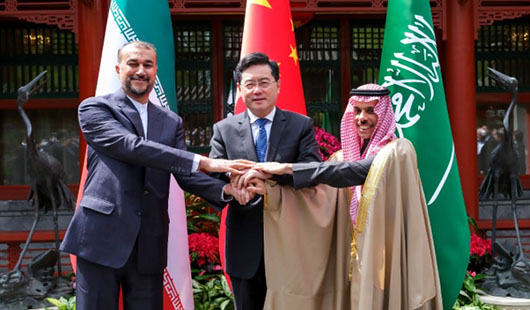FPI / June 28, 2023
President Donald Trump scored a major foreign policy triumph in bringing Israel, the United Arab Emirates, Bahrain, and Morocco into a joint normalization agreement known as the Abraham Accords.

But, as with many tenets of the previous administration’s foreign policy, the Biden administration has shown little interest in maintaining the Abraham Accords — until now.
“Faced with China’s growing influence in the Middle East, the White House has realized that the Accords could be a major vehicle for Washington’s retaining influence in the region,” Dov S. Zakheim, a senior adviser at the Center for Strategic and International Studies, wrote in a June 23 analysis.
The Biden team has taken special interest in expanding the Accords to include Saudi Arabia. Secretary of State Antony Blinken has said that normalizing Saudi-Israeli relations is a top priority of the administration.
Another Team Biden priority, however, is seen as a major obstacle to the Abraham Accords progressing — reviving the nuclear deal with Iran.
“Washington is trying to have it both ways,” Zakheim wrote. “It wants the Saudis and Israelis to be the fulcrum of a Gulf-wide effort to deter Iranian aggression through the vehicle of the Abraham Accords. Yet it is prepared to cut a deal with Iran that would allow Teheran to remain but a short step away from producing a bomb that could threaten both countries. Such a policy is likely to alienate the Israelis, the Saudis and indeed the other Gulf states, and could lead to even greater Iranian influence in the region, to the ultimate detriment of the United States and its Israeli and Arab allies.”
The Biden administration continues to negotiate with Iran in hopes of reaching an informal understanding with the ruling clerics in Teheran that would bring an end to Iranian targeting of American forces, as well as the release of Americans in Iranian captivity. In exchange, Iran would be allowed to enrich uranium at the 60 percent level and the U.S. would allow South Korean banks to release $7 billion to be spent on humanitarian programs.
If Iran were to retain its enriched fuel at the 60 percent level, it still would be positioned to develop a bomb within weeks, analysts say.
Full Report . . . . Current Edition . . . . Subscription Information
Free Press International
